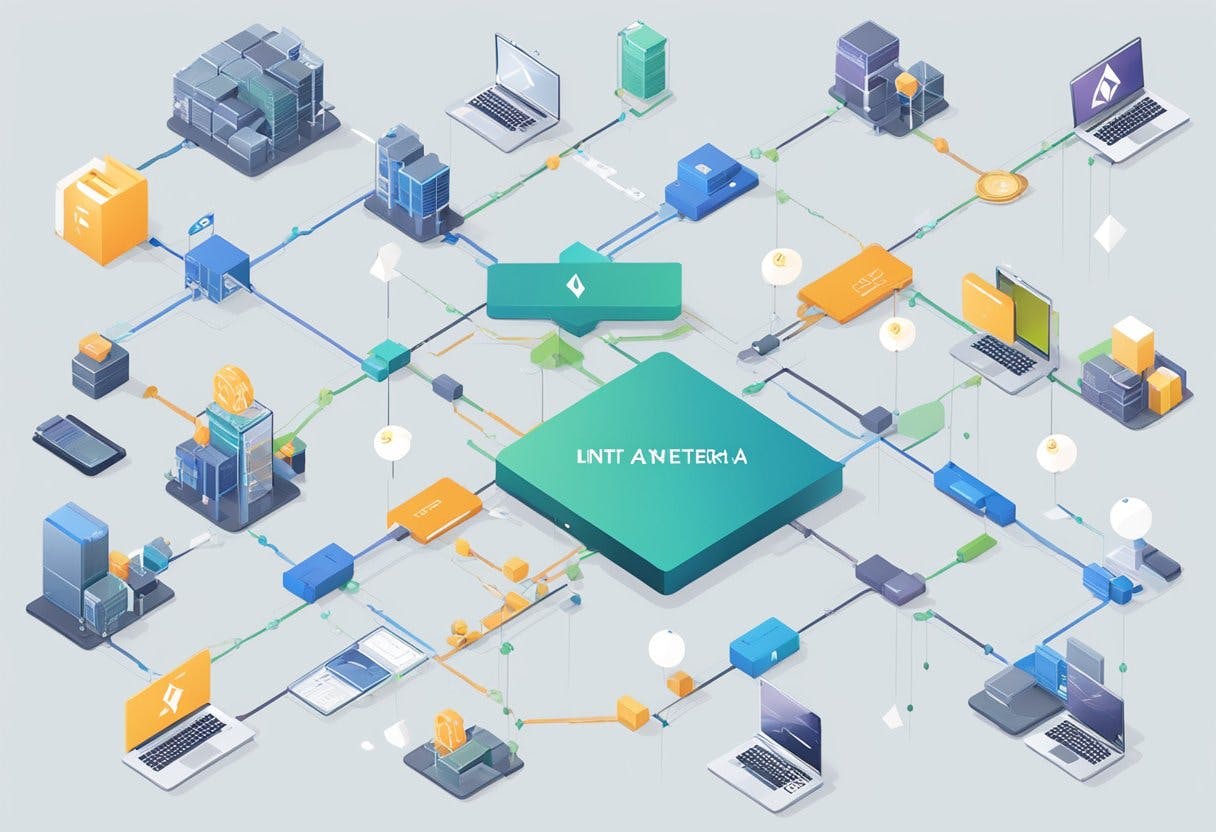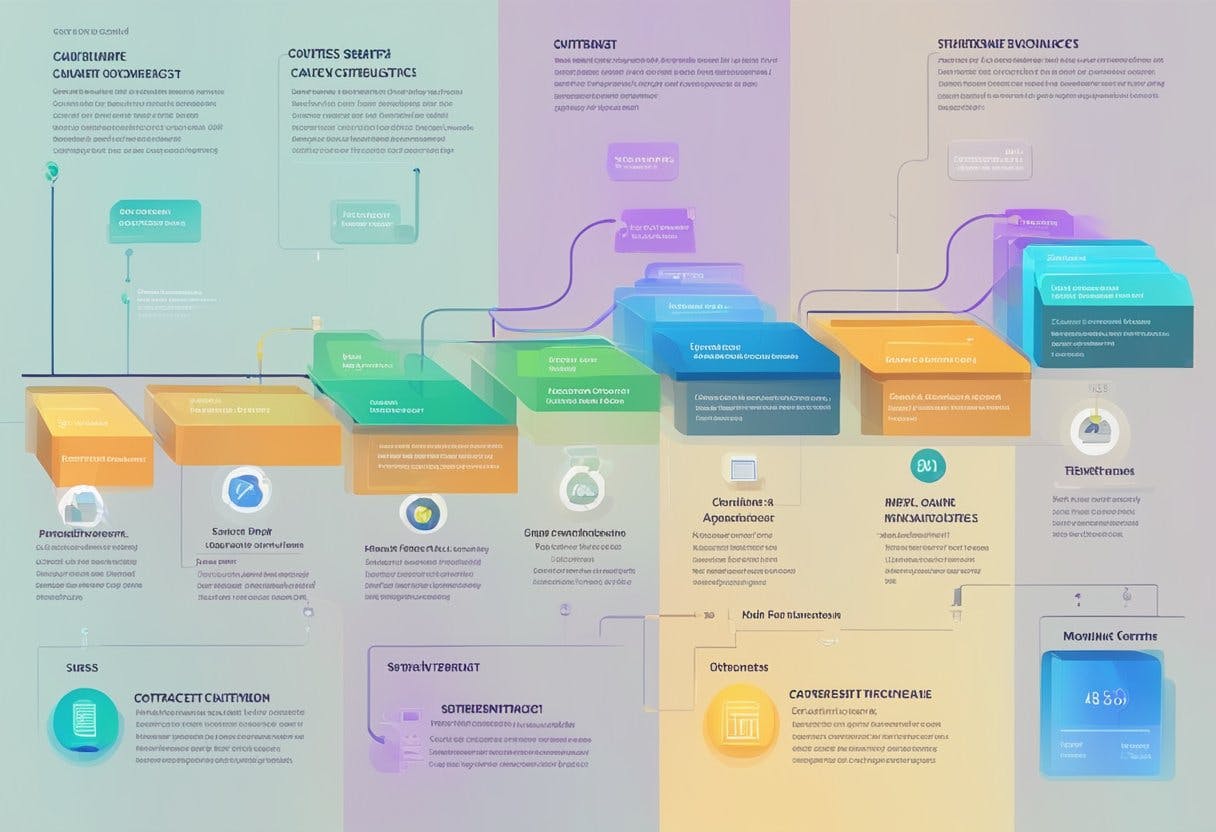
Smart contracts have been hailed as the future of digital transactions. These self-executing contracts run on blockchain technology and can automate the entire process of a contract, from negotiation to verification of fulfillment. Ethereum is the most well-known platform that enables the creation of smart contracts, but there are other platforms that offer similar functionality.

The evolution of smart contracts has led to their use in various industries, including finance and supply chain management. In financial services, smart contracts can automate processes such as securities trade clearing and settlement, reducing the need for intermediaries and streamlining the process. In supply chain management, smart contracts can track the movement of goods and verify the authenticity of products, reducing the risk of fraud and ensuring accountability.
Key Takeaways
- Smart contracts are self-executing contracts that run on blockchain technology.
- Smart contracts have expanded beyond Ethereum to other platforms and industries.
- Smart contracts can automate processes and increase efficiency in finance and supply chain management.
The Evolution of Smart Contracts

Smart contracts have come a long way since their inception in 1994 by Nick Szabo. Initially, the concept of smart contracts was limited to Bitcoin as a means of automating transactions. However, with the advent of Ethereum, the world of smart contracts has expanded beyond simple transactions to encompass a wide range of digital agreements.
From Bitcoin to Broader Applications
Bitcoin was the first cryptocurrency to use blockchain technology, and it was also the first to implement smart contracts. However, the smart contracts on Bitcoin were limited to a few basic features, such as multisignature transactions and time-locked transactions. These contracts were not Turing-complete, which means they could not execute complex operations.
Ethereum, on the other hand, was designed to be a platform for building decentralized applications (dApps) that use smart contracts. Ethereum’s smart contracts are Turing-complete, which means they can execute any operation that a computer can perform. This has opened up a wide range of possibilities for smart contracts, including the creation of digital assets, decentralized exchanges, and even entire autonomous organizations.
Nick Szabo’s Vision Realized
Nick Szabo, the creator of smart contracts, envisioned a world where digital agreements could be executed automatically, without the need for intermediaries. With the rise of Ethereum and other blockchain platforms, this vision is becoming a reality. Smart contracts can now be used to execute complex agreements, such as supply chain management, insurance claims, and real estate transactions.
The potential uses for smart contracts are vast, and they are only limited by our imagination. As the technology continues to evolve, we can expect to see even more innovative use cases for smart contracts. From reducing fraud and increasing transparency to streamlining business processes and reducing costs, smart contracts have the potential to revolutionize the way we do business.
In conclusion, smart contracts have come a long way since their inception, and they are now being used for a wide range of applications beyond simple transactions. With the rise of Ethereum and other blockchain platforms, we can expect to see even more innovative use cases for smart contracts in the future.
Smart Contracts in Financial Services

Smart contracts are self-executing agreements with the terms of the agreement between buyer and seller being directly written into lines of code. The code and the agreements contained therein exist on a decentralized blockchain network, making them secure, transparent, and immutable. Smart contracts can be used in various industries, but they have particularly promising use cases in financial services.
Decentralized Finance (DeFi) Innovations
Decentralized Finance (DeFi) is a blockchain-based financial infrastructure that has gained a lot of traction in recent years. DeFi provides an open, permissionless, and highly interoperable protocol stack built on public smart contract platforms, such as the Ethereum blockchain. DeFi applications can be used for lending, borrowing, and trading without the need for intermediaries, such as banks or brokers. Smart contracts can automatically execute the terms of the agreement between borrowers and lenders, making the process more efficient, transparent, and secure.
Improving Traditional Banking
Smart contracts can also be used to improve traditional banking processes. For example, banks can use smart contracts to automate the process of loan approval, reducing the time it takes to approve a loan and making the process more efficient. Smart contracts can also be used to automate the process of mortgage underwriting, reducing the time it takes to underwrite a mortgage and making the process more transparent.
Securities Trade Clearing and Settlement
Smart contracts can also be used to improve securities trade clearing and settlement. In traditional securities trading, the clearing and settlement process can take days, with multiple intermediaries involved in the process. Smart contracts can automate this process, reducing the time it takes to clear and settle trades and reducing the risk of errors. For example, the use of smart contracts in securities trade clearing and settlement can reduce the risk of settlement failures and improve the efficiency of the process.
In summary, smart contracts have promising use cases in financial services. They can be used to improve the efficiency, transparency, and security of processes in lending, borrowing, securities trade clearing and settlement, and other financial services.
Smart Contracts in Supply Chain Management

Smart contracts have the potential to revolutionize supply chain management by enabling secure and automated transactions between parties. They can help reduce the need for intermediaries, enhance traceability, and increase efficiency in the supply chain.
Enhancing Traceability and Efficiency
Smart contracts can enhance traceability in the supply chain by recording transactions in a tamper-proof and transparent manner. This can help reduce the risk of fraud and increase trust between parties. Smart contracts can also automate the execution of transactions, reducing the need for manual intervention and speeding up the process. This can help increase efficiency and reduce costs in the supply chain.
ERP systems can be integrated with smart contracts to enable real-time tracking of inventory and orders. This can help improve supply chain visibility and enable more accurate demand forecasting. Smart contracts can also be used to automate the payment process, reducing the risk of errors and delays.
Case Studies in Logistics
Several logistics companies have already started using smart contracts to improve their supply chain management processes. For example, Maersk, the world’s largest container shipping company, has partnered with IBM to develop a blockchain-based platform for tracking and verifying cargo. The platform uses smart contracts to automate the execution of transactions between parties and enable real-time tracking of cargo.
Another example is Walmart, which has implemented a blockchain-based system for tracking the origin of food products. The system uses smart contracts to record transactions between parties and enable real-time tracking of products from farm to store. This has helped improve traceability and reduce the risk of foodborne illness outbreaks.
In conclusion, smart contracts have the potential to transform supply chain management by enhancing traceability and efficiency. By automating transactions and reducing the need for intermediaries, smart contracts can help reduce costs and increase trust between parties. As more companies adopt blockchain technology, we can expect to see more use cases for smart contracts in the supply chain.
Expanding Use Cases in Other Industries
Smart contracts are not limited to the financial sector or Ethereum blockchain. Other industries are beginning to explore the potential of smart contracts to streamline processes, reduce costs, and enhance security.
Revolutionizing Healthcare
Smart contracts can help to streamline healthcare processes, reduce costs, and improve patient outcomes. For example, smart contracts can be used to manage patient data securely and efficiently, automate insurance claims processing, and ensure compliance with regulatory requirements.
Transforming Real Estate and Insurance
Smart contracts can be used to automate real estate transactions, reduce fraud, and lower transaction costs. They can also be used to automate insurance claims processing and improve the accuracy of underwriting. For example, smart contracts can be used to automate the verification of property ownership, automate the transfer of property titles, and automate the payment of insurance claims.
Innovations in Gaming and NFTs
Smart contracts can be used to create new business models in the gaming industry, such as pay-per-play or pay-per-win models. They can also be used to create non-fungible tokens (NFTs) that represent unique digital assets, such as in-game items or collectibles. NFTs can also be used to automate royalty payments to content creators and other stakeholders in the gaming industry.
Overall, smart contracts have the potential to revolutionize many industries beyond finance. As more companies explore the potential of smart contracts, we can expect to see new use cases emerge in industries such as healthcare, real estate, insurance, gaming, and NFTs.
Challenges and Future of Smart Contracts
Smart contracts have the potential to revolutionize the way we conduct business by providing a secure, transparent, and tamper-proof way to execute transactions. However, despite the numerous benefits, there are still several challenges that need to be addressed for smart contracts to become widely adopted.
Addressing Performance and Scalability
One of the most significant challenges facing smart contracts is their performance and scalability. As more transactions are added to a blockchain, the network can become congested, leading to slower transaction times and higher fees. This can be a significant issue for businesses that rely on fast and efficient transactions to remain competitive.
To address this challenge, several blockchain platforms are exploring new solutions, such as sharding and sidechains, to improve the performance and scalability of smart contracts. These solutions aim to increase the number of transactions that can be processed simultaneously, while also reducing the time and cost of executing transactions.
Legal and Regulatory Hurdles
Another challenge facing smart contracts is the legal and regulatory hurdles that need to be overcome. Smart contracts are still a relatively new technology, and there is a lack of legal clarity surrounding their use. This can make it challenging for businesses to adopt smart contracts, as they may be uncertain about the legality of using them.
To address this challenge, governments and regulatory bodies need to work together to develop clear guidelines and regulations surrounding smart contracts. This will provide businesses with the legal certainty they need to adopt smart contracts and take advantage of their benefits.
The Road Ahead: Interoperability and New Business Models
Interoperability is another challenge facing smart contracts. As more blockchain platforms emerge, there is a growing need for interoperability between them. This will allow businesses to use smart contracts across multiple platforms, making it easier to conduct cross-border transactions and expand into new markets.
To overcome this challenge, several blockchain platforms are exploring solutions such as cross-chain communication protocols and interoperability standards. These solutions aim to provide a seamless experience for businesses using smart contracts across multiple platforms.
Finally, smart contracts have the potential to create new business models, but this will require a shift in mindset from traditional business models. As smart contracts become more widely adopted, businesses will need to adapt to new ways of conducting transactions, such as automated payments and decentralized decision-making.
In conclusion, while there are still several challenges facing smart contracts, the future looks bright. As blockchain technology continues to evolve, we can expect to see new solutions emerge that address these challenges and unlock the full potential of smart contracts.
Frequently Asked Questions
What are the primary applications of smart contracts outside of the Ethereum platform?
Smart contracts are not only limited to Ethereum platform, but they can be applied to various blockchain platforms. Smart contracts are used in supply chain management, real estate, healthcare, and voting systems. They can be used to automate processes, enforce agreements, and ensure transparency in various industries.
How are smart contracts revolutionizing the finance industry?
The finance industry is one of the primary beneficiaries of smart contract technology. Smart contracts can automate financial operations, reduce transaction costs, and ensure transparency. They can be used to create decentralized financial systems, such as decentralized exchanges, lending platforms, and insurance systems.
What are some innovative smart contract project ideas beyond the Ethereum ecosystem?
Smart contracts can be applied to various blockchain platforms beyond Ethereum. For example, Hedera Hashgraph is a blockchain platform that uses smart contracts to create decentralized applications. Smart contracts can be used to create decentralized social media platforms, gaming platforms, and prediction markets.
What are the key benefits and characteristics of smart contracts in various industries?
Smart contracts are immutable, transparent, and decentralized. They can automate processes, reduce transaction costs, and ensure transparency. In the healthcare industry, smart contracts can be used to ensure data privacy and secure data sharing. In the real estate industry, smart contracts can be used to automate property transfers and ensure transparency in property transactions.
How is Hedera Hashgraph utilized in smart contract use cases?
Hedera Hashgraph is a blockchain platform that uses smart contracts to create decentralized applications. It provides fast and secure transactions with low transaction costs. Smart contracts can be used to create decentralized applications, such as social media platforms, gaming platforms, and prediction markets.
In what real-world scenarios are smart contracts currently being implemented effectively?
Smart contracts are being implemented effectively in various industries. In the supply chain management industry, smart contracts are used to track products from the manufacturer to the end consumer. In the healthcare industry, smart contracts are used to secure data sharing and ensure data privacy. In the real estate industry, smart contracts are used to automate property transfers and ensure transparency in property transactions.
Read More




